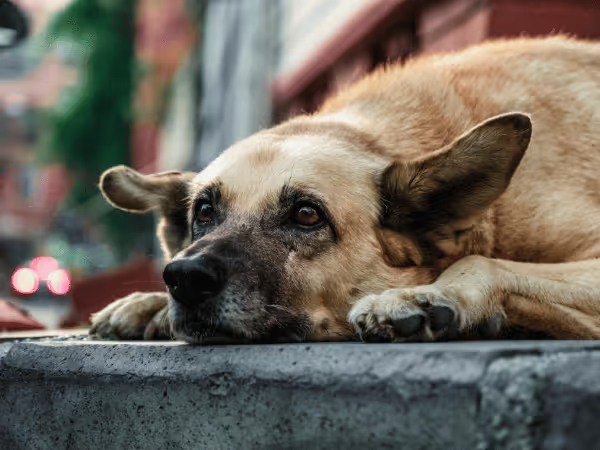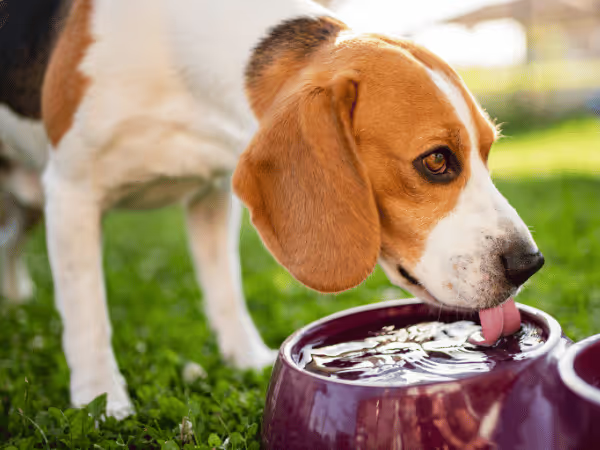Dehydration in dogs is a year-round concern. Whether it’s due to warm summer weather, dry air during the cold season, strenuous activity, or health conditions, dehydration can escalate quickly for dogs of all ages. This is why it’s crucial for pet parents to recognize the early symptoms of dehydration in dogs and know when to consult a veterinarian.
Whether you’re looking to be prepared or checking your dog’s current condition, this Sploot Vets guide is here to help!
Which Dogs Are at Risk of Dehydration or Poor Hydration?
Whether or not a dog is at risk of dehydration or poor hydration depends on their age, lifestyle, environment, and overall health. The following dogs typically have a higher chance of experiencing dehydration:
- Puppies and senior dogs
- Smaller dog breeds (faster metabolism)
- Flat-faced or brachycephalic dog breeds (prone to overheating and consequent dehydration)
- Dogs exposed to hot environments
- Dogs that are swimming, hiking, or doing other strenuous activities
- Dogs suffering from chronic vomiting and diarrhea
- Dogs with a fever (fluid loss from increased panting)
- Dogs on medications that are diuretics (i.e., meds for heart conditions, seizures, and edema)
- Dogs recovering from any kind of surgery

Early Symptoms of Dehydration in Dogs
The following symptoms are indicative of early or mild dehydration in dogs:
- Slightly darker or reduced urine output
- Dry or sticky gums (instead of being slick and moist)
- Slightly sunken eyes
- Lethargy or decreased energy
- Panting more than usual
- Decreased appetite
- Refusal to drink water
- Reduced skin elasticity when doing the skin tent test
Note: The skin tent test is done by pinching your dog’s skin gently over their shoulder blades. If their skin doesn’t snap back within 1–2 seconds (and instead stays tented), they may be dehydrated.
Signs of Severe Dehydration in Dogs
Once dehydration starts, it can quickly escalate, especially if the dog is in a hot environment or refusing to drink. Here are the symptoms of severe or prolonged dehydration in dogs. If you notice any of the following, your dog may require urgent or emergency veterinary care.
- No skin elasticity (skin stays tented or takes several seconds to return).
- Very dry, pale, or bluish gums
- No urine output
- Rapid heart rate
- Cool paws, ears, and limbs
- Shock-like symptoms (e.g., confusion, trembling, or unresponsiveness)
- Weakness or collapse
Note: Noticing severe symptoms in your pet? Sploot Vets is a trusted provider of urgent care and emergency vet services in Denver, Colorado Springs, & Chicago, with extended vet clinic hours (8 AM to 8 PM). Call our team for the next steps→

How To Treat Dehydration In Dogs at Home
When dehydration in dogs is in its early stages, there is still a chance it can be treated at home. However, we recommend that pet parents call a vet if they notice any symptoms related to dehydration. Here are steps you can take if you suspect your dog has mild or early symptoms of dehydration:
- Call a veterinarian – Even if your dog has mild symptoms, we highly recommend calling a vet; they can guide you through the next steps and provide other helpful first aid tips, especially if your dog is also suffering from overheating.
- Encourage drinking – Encourage your dog to take small sips of fresh water. You can also try offering ice cubes, a hydrating and cooling treat that most dogs love.
- Give your dog a low-sodium broth – If your dog refuses water or ice cubes, try offering them low-sodium broth; the flavor and scent may entice some dogs to drink
- Move your dog to a cool, comfortable place – Keep your dog calm, out of the sun, and in a temperature-controlled room. This is especially important if they are suffering from overheating or exhaustion.
When to Seek Urgent Vet Care for Dehydration in Dogs
If you see any of the following severe symptoms of dehydration in dogs, we highly recommend reaching out to an urgent care veterinarian or emergency vet as soon as possible:
- Refusing water and food
- Experiencing worsening symptoms
- Experiencing severe signs of dehydration in dogs (e.g., extreme weakness, cold extremities, trembling, collapse)
Once you bring your dog to an urgent or emergency care vet clinic, the vets will provide treatment to help stabilize their condition. This typically involves the administration of fluids intravenously or subcutaneously, which helps quickly restore your dog’s hydration and electrolyte balance.
In addition, vets may request veterinary diagnostic tests, which look at certain biomarkers to measure your dog’s overall health and rule out any possible co-occurring health conditions that could have contributed to their dehydration.
Note: In need of assistance? Sploot Vets is here for you. We provide urgent care and emergency vet services in Colorado Springs, Denver, & Chicago with extended vet clinic hours (8 AM to 8 PM) that you can count on. Call us for next steps→

Final Thoughts on Dog Dehydration
When it comes to dehydration in dogs, prevention is always the best approach. Here are a few helpful tips:
- Ensure that your dog has access to fresh water at all times.
- If you are going on a swimming or hiking trip with your dog, make sure to offer water every 15 to 20 minutes, especially during warmer months.
- You can also incorporate wet dog food to boost hydration; this is extra beneficial for smaller dogs, brachycephalic breeds, and senior dogs.
- Monitor your dog’s urine output and dog poop consistency as these also offer valuable clues regarding hydration.
Sploot Vets: Urgent Care & Emergency Vet Services for Dogs
In need of urgent care or emergency vet services? Sploot Veterinary Care is here to help! We’re open 365 days a year for extended hours (8 AM to 8 PM).
Get top-notch, all-in-one vet care in one of our vet clinics in Colorado Springs, Denver, and Chicago. We provide primary care, urgent care, and emergency vet services all under one woof™.
Our experienced veterinarians are here for you. Plus, our modern vet clinics feature spacious exam rooms, in-house diagnostics, and dedicated surgical suites, allowing us to handle more than 95% of your pet’s healthcare needs, with rates up to 60% lower than those of 24/7 vet ERs.
Easily arrange an urgent care or emergency vet appointment for your dog at Sploot by calling us at (720) 770-8656.






